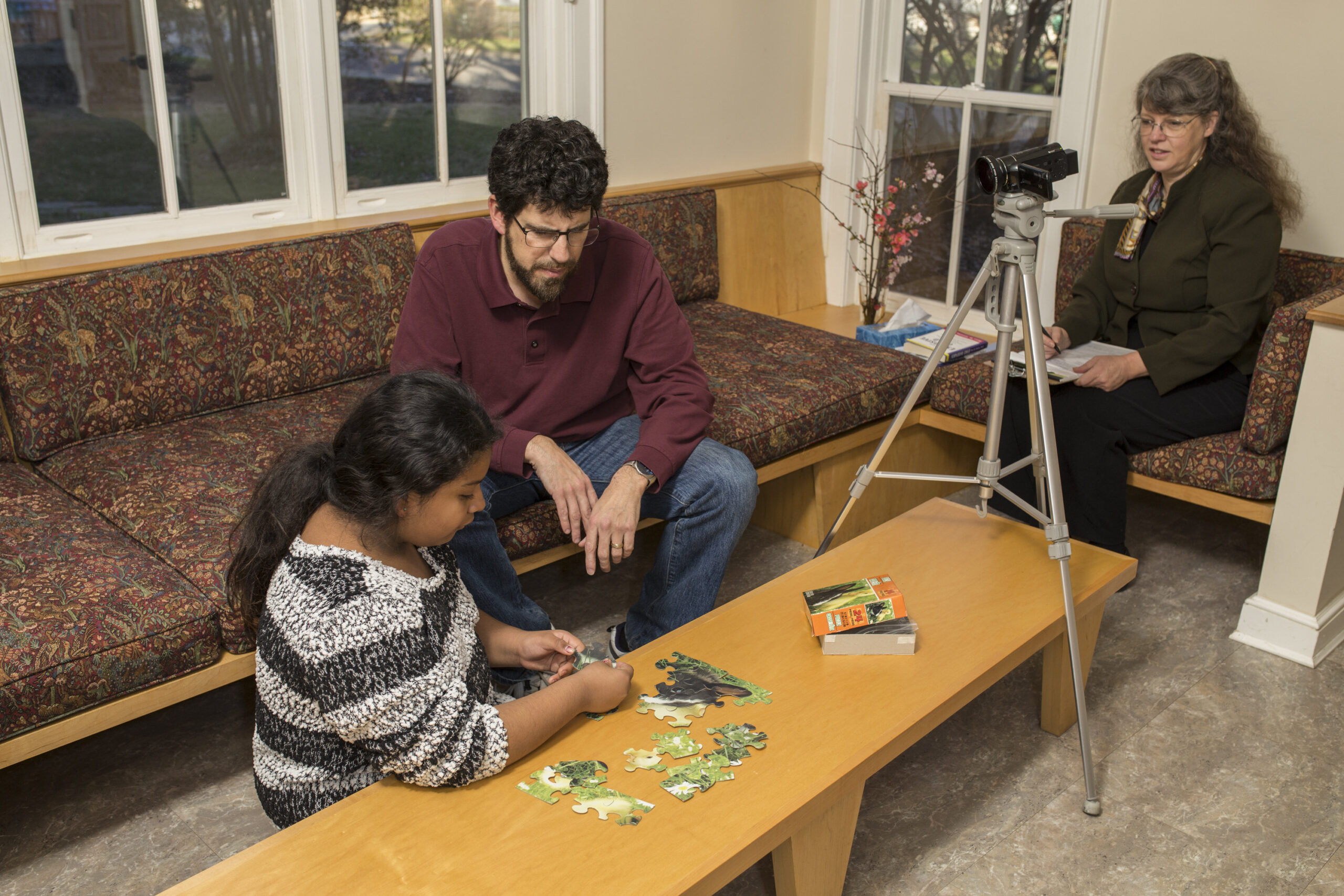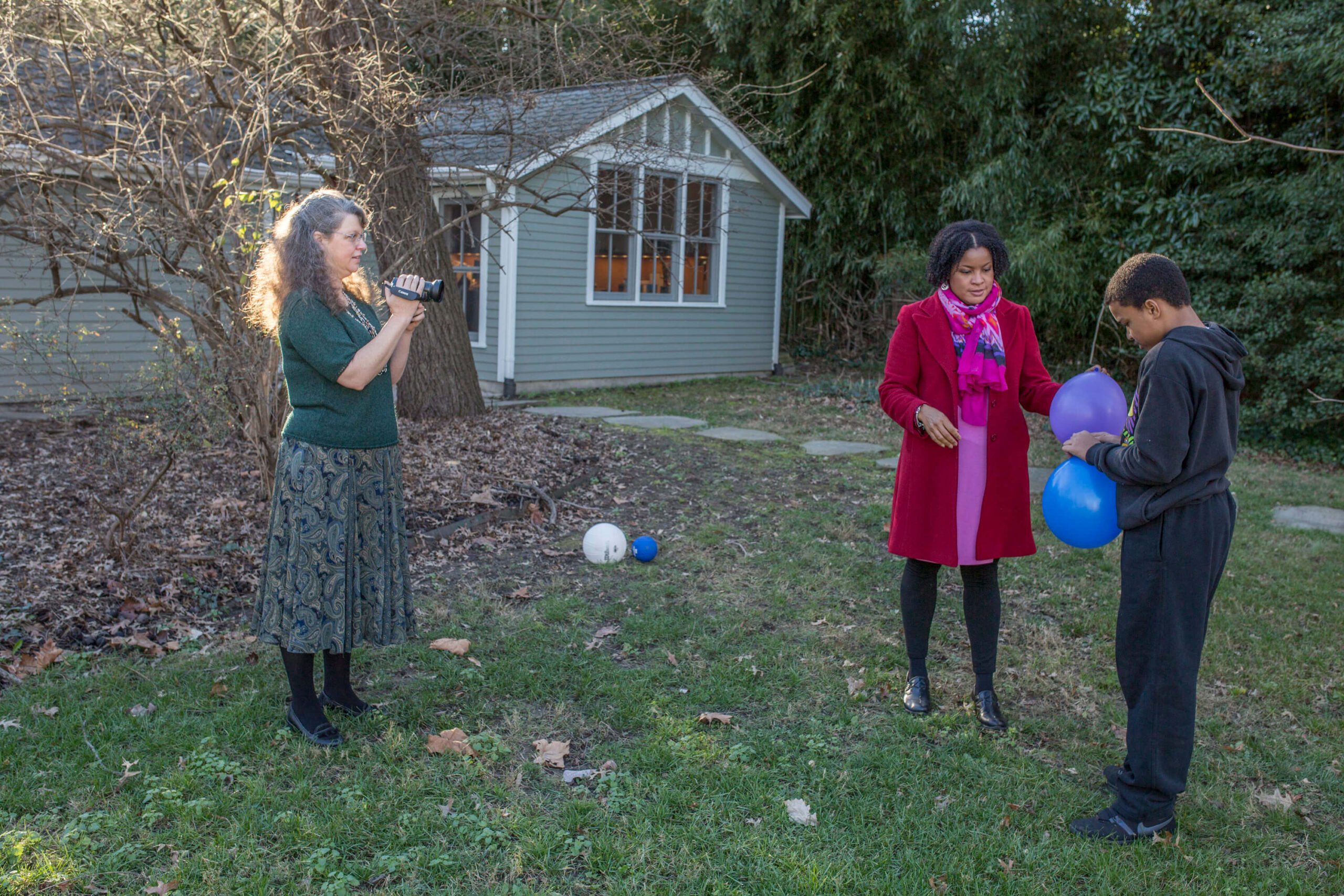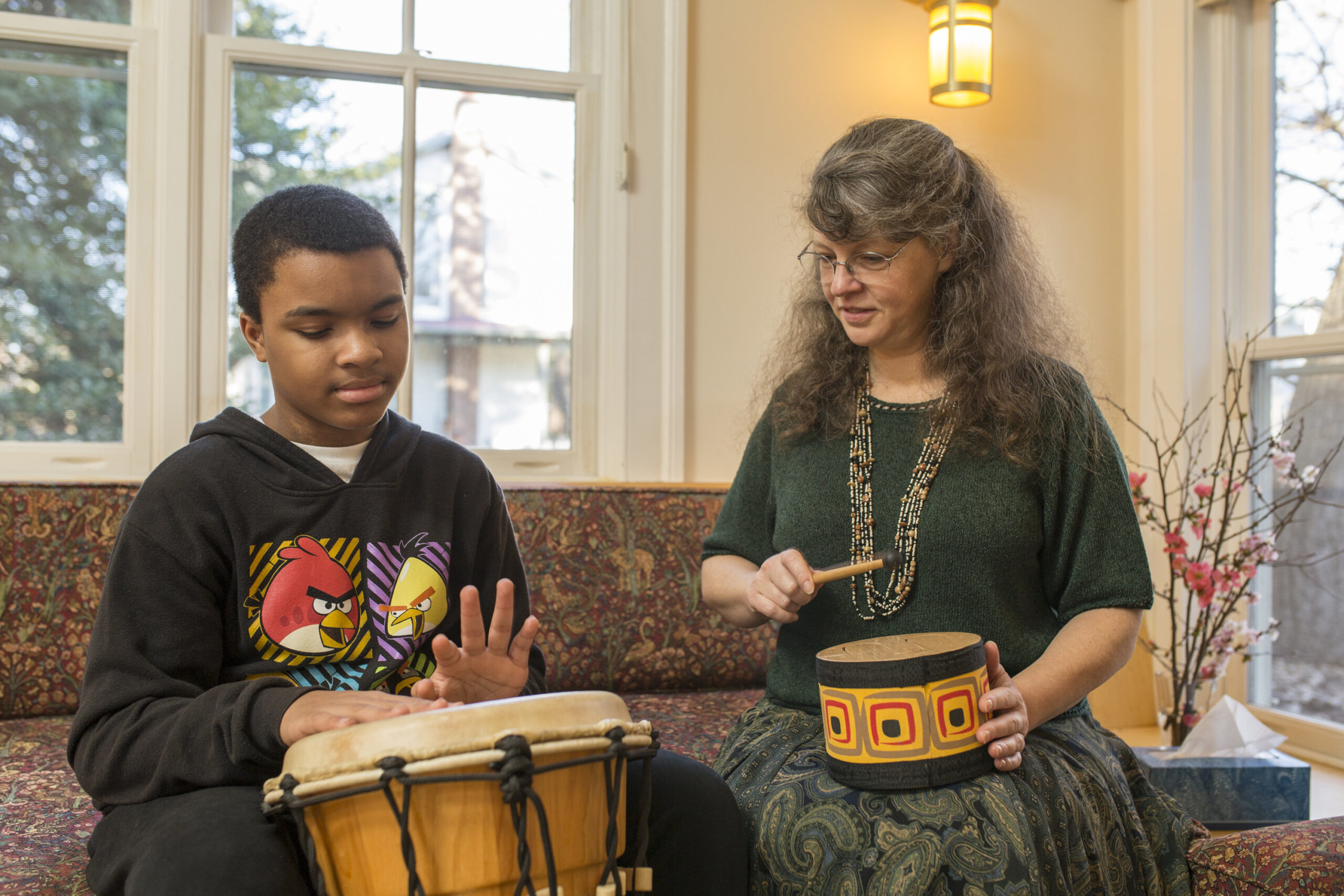Guiding Families (RDI™)



What is RDI™?
[Adapted from a chapter by Rachelle Sheely, Ph.D., in the new edition of Understanding Autism for Dummies, due for release in 2024]
Relationship-based Dynamic Intelligence (RDI™) is a family-empowerment program designed to address the well-being of autistic people. RDI™ consultants believe that everyone has potential and vulnerabilities, and a diagnosis of autism does not change a person’s desire for a satisfying job, friendships, and autonomy.
In RDI™, trained consultants work with parents to teach them how to provide, form, and manage the guiding relationship that is sometimes disrupted when a child is autistic. The guiding relationship is the context in which a universal developmental trajectory unfolds; one that fosters the development of dynamic intelligence (the ability to flexibly solve problems and navigate new challenges) and the mental resources needed to thrive, and flourish. The most-recent paper published about RDI™, Transforming the Well-Being of Persons with Autism, documents outcomes when RDI™ is systematically delivered with standards that honor the unique strengths of families and autistic children of all ages.
What is the philosophy of RDI?
RDI™ focuses on identifying and establishing the cognitive processes that may have been missed in your child’s early development.
We start by teaching parents about what autism is (not based on the diagnostic criteria, but based on research and on many conversations with autistic people).
The next step involves re-establishing what we call “the guiding relationship”. Because parents are prone to misinterpreting the information they are getting from their kids (because their kids respond in ways that may not make sense if you aren’t autistic) there is often a break in this fundamental relationship between parent and child. The goal is to help parents interpret what their kids are doing by thinking about what it is about their wiring that makes them respond as they do. It’s all about helping kids feel loved unconditionally for who they are.
Once kids and parents enjoy being around each other again, we start working on helping the kids to understand why their parents respond as they do, and we evaluate what developmental stages have been missed because of the breakdown in the guiding relationship. Then, and only then, can we dive into the work of helping the children through those developmental stages in a way that fundamentally respects who they are.
Basic program principles
Learning must be:
- Objective-based
- Authentic and experience-based—not too easy, not too difficult
- Just one-step ahead of the current level of competence
- Based on mental challenge—the impetus for mental growth
- Developed with the goal of increasing self-organization and self-regulation
- Personally-constructed to allow the person to form knowledge that is meaningful to them
- Structured to build resilience
- Situated for real-world experience
- An integral part of the family dynamic that supports the autistic person as a contributing, important member of the family
- Integrated to address the growth of self, mind, and brain.
As you work on the goals and objectives of RDI™, your child will:
- Problem solve in a more thoughtful, creative, and flexible manner;
- Communicate more effectively, using appropriate verbal (for those who are able) and non-verbal aspects of social language;
- Better regulate his or her emotions and behavior;
- More appropriately express empathy and improve his or her ability to take the perspective of others;
- Feel more competent, with greater assurance of his or her own self-worth;
- More easily adapt to new situations, settings, and routine changes;
- Be more independent at school; and
- Have a stronger relationship with parents, teachers, and peers.
The relationship between consultant, caregiver, and apprentice/child
RDI™ was developed based on the understanding that autism can disrupt the guiding relationship between parent and child. This disruption is not permanent and the guiding relationship can exist the way it was intended; caregivers simply need guidance to re-establish it. Because of this, our goal is to work ourselves out of a job, not into the job. The goal is that eventually, there will only be a need for intermittent meetings based on a desire to check-in or in response to a problem that may emerge. Re-establishing the guiding relationship is how this process of empowering caregivers begins.
How does RDI™ work?
First, RDI works carefully. Based on the way that families world-wide enculturate their beliefs and values and communicate them to their children, RDI is structured to first restore the family mentor/apprentice structure that can be disrupted by autism. Rather than testing, which is usually administered by a professional to a child, the standardized Relationship Developmental Assessment asks caregivers and their children to interact with each other; those interactions are then analyzed by a certified RDI™ consultant. This allows for a more user-friendly, comfortable, and better-informed observation. Using this data, a unique plan is created to restore the guiding relationship.
If the guiding relationship is not in place, work with an autistic person often requires caregivers and other natural mentors to manipulate their behaviors and/or the environment using external rewards designed to “get the person to do something”. The restoration of the guiding relationship allows children to become increasingly motivated by their own competence and sense of self, from the inside out, so they can take-on their own learning.
As this interplay between trust and competence takes shape, the parent (as guide) learns to provide productive mental challenges. This is a central component of all RDI™ programs: Mental growth occurs as the apprentice navigates just right challenges that fall comfortably between too easy and too difficult. To keep these challenges just right, there is always familiar information that is similar to that encountered in past experiences. Most importantly, students must view the new challenge as engaging and solvable, rather than confusing, threatening, or overwhelming.
Described in significantly more detail in The RDI Book these mental challenges allow autistic people to develop agency and the ability to intentionally influence their own functioning and life circumstances. No longer simply an onlooker responding to outside stimuli, they develop the mental ability to self-organize, self-regulate, and self-reflect.
Always objective-driven, there is an everyday drama that occurs through these intentionally structured, experience-based interactions that parents and other adult role-models spontaneously implement when the opportunities present themselves.
What is a typical session like?
Typically, meetings occur weekly or every two weeks for about an hour, either in person or on-line. Meetings are structured to include a discussion of the objective and its evolution, framing of an activity, customization of that activity based on the objective, followed by demonstration, with the family practicing or using role-play to rehearse implementation of the homework assignment.
While these meetings are important, what happens between sessions is more important, as most of the work involves assignments to be done between sessions. These assignments sometimes involve reading about a particular skill or developmental stage, watching a video, or creating an individualized plan to address a particular challenge. More often, the assignments involve practicing a skill. Over the course of the week families upload their assignments—videos or written work–onto the learning system. Each assignment is accompanied by self-analysis that ranges from “We feel we have mastered this objective”, to “We need a little more practice” OR “Help, something is not working”. Thus, because each meeting is based on communication between sessions, the time the family spends with the consultant in each session is productive from the start.
One method for learning a skill is to videotape yourself practicing with your child. Your assignment might be to analyze the video, pointing out what you did, how your child responded, and what might have happened if you had done something different. I will also watch your video, and will do my own analysis. At the next session, we will discuss what we learned, and work together to determine what your next steps should be.
This work is supported by the RDI-OS (RDI™ Operating System), a secure, web-based system that connects parents and consultants, provides program information, and connects the members of the world-wide RDI™ community.
Through collaboration, and by learning how to analyze and improve your performance, you will learn how to become the most effective teacher possible for your child.
Where can I learn more?
Because RDI is an intervention model based on child development, it is not a behavior therapy, nor a checklist of skills that must be learned. Instead, we start by gradually rebuilding the foundations of the Guiding Relationship that have been affected by autism. We teach parents how to create customized experiences that focus on activating a child’s natural desire to seek growth, build intrinsic motivation, and give the child the mental and emotional wherewithal to survive in a constantly changing, dynamic world.
Not quite ready to jump in? Learn about autism, the RDI program, and how to connect with your child in this 5-hour one-day short course.
You will learn about:
- The history of RDI® and what autism is;
- What an RDI® Consultant does;
- Dynamic vs static thinking (and why is it matters);
- Ways to spend time with your child (RDI® is a parent activities-based model);
- Why RDI® focuses on communication;
- The guiding relationship;
- The RDI assessment, and;
- The importance of self-evaluation.
What is the RDI-OS Learning Platform?
The RDI™ Learning Community is integral to the delivery of RDI™. It is a self-paced online education system accessible anywhere and any time. Depending on your interests and needs, you can access expert knowledge through on-line webinars, multimedia eLearning courses and tutorials that are dynamically configured to meet your needs.
Community members have their own customized objectives, but they can also guide other learners. You can help others as your experience allows, and get help when you need it. If you wish, you can create community resources, contributing to topic-specific wikis, forums, and blogs.
Learn more about the platform on the RDI™ website.
Publications
- Gutstein, S. E., Burgess, A. F., & Montfort, K. (2007). Evaluation of the relationship development intervention program. Autism, 11(5), 397-411. https://pubmed.ncbi.nlm.nih.gov/17942454/
- Gutstein, S. E. (2009). Empowering families through relationship development intervention: an important part of the biopsychosocial management of autism spectrum disorders. Ann Clin Psychiatry, 21(3), 174-182. https://pubmed.ncbi.nlm.nih.gov/19758538/
- Beurkens, N. M., Hobson, J. A., & Hobson, R. P. (2013). Autism severity and qualities of parent–child relations. Journal Of Autism and Developmental Disorders, 43(1), 168-178. https://pubmed.ncbi.nlm.nih.gov/22673860/
- Larkin, F., Guerin, S., Hobson, J. A., & Gutstein, S. E. (2013). The Relationship Development Assessment–Research Version: Preliminary validation of a clinical tool and coding schemes to measure parent-child interaction in autism. Clinical Child Psychology And Psychiatry, https://pubmed.ncbi.nlm.nih.gov/24366957/
- Hobson, J. A., Tarver, L., Beurkens, N., & Hobson, R. P. (2016). The Relation between Severity of Autism and Caregiver-Child Interaction: A Study in the Context of Relationship Development Intervention. Journal of Abnormal Child Psychology, 44(4), 745-55. https://link.springer.com/article/10.1007/s10802-015-0067-y.
- Kerwin, M.E., Soreth, M.E., & Gangemi, C. (2016). Preliminary efficacy of Relationship Development Intervention and Parent-Implemented Applied Behavior Analysis/Verbal Behavior on joint attention and communication of preschool children with autism. Poster presented at the meeting of the International Meeting for Autism Research (IMFAR), May 2016, Baltimore, MD, USA.
- Gutstein, S.E. & Sheely, R.K. (2023). Transforming the well-being of persons with autism, Psychoanalytic Inquiry, 43(3), 158-183, https://www.tandfonline.com/doi/full/10.1080/07351690.2023.2185062
- McAuliffe, T., Apps, B. & Setchell, J. (2023). Using Relationship Development Intervention with Autistic Children and Their Families: The Experiences of RDI Consultants in Australia. J Dev Phys Disabil (2023). https://doi.org/10.1007/s10882-023-09925-5